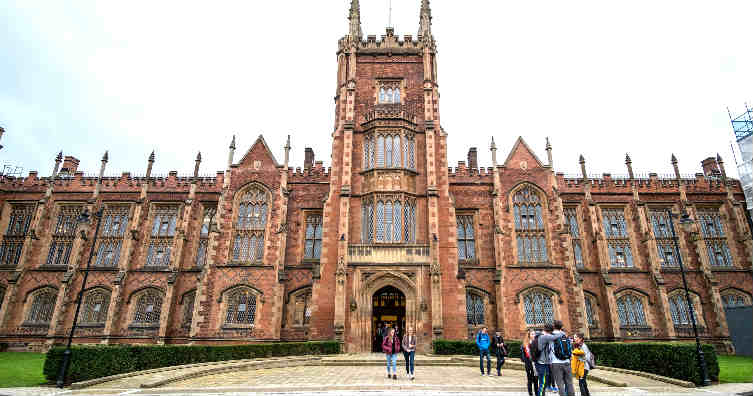Postgraduate Loans in Northern Ireland 2025
Not sure if your budget can stretch to a master's degree? We take a look at the Student Finance available to postgraduate students in Northern Ireland – minus the jargon.

Credit: Moomusician – Shutterstock
Doing a postgraduate course like a master's degree is a great way to enhance your knowledge on a subject you're passionate about, and it looks great on your CV.
But there's no denying that, for those from Northern Ireland, the postgraduate Student Finance package isn't quite as generous as undergraduate support.
While you can expect a chunk of money to help cover your tuition fees, you won't get anything for your living costs – and you'll need to meet the specific eligibility criteria to get anything at all. Here, we'll go through it all step-by-step so you know exactly what funding you can (and can't) receive.
What's in this guide?
Eligibility for Northern Ireland postgraduate finance

Credit: gmstockstudio – Shutterstock
Here are the main eligibility criteria for Student Finance Northern Ireland's Postgraduate Loan:
-
Where you live
The residency requirements for Student Finance NI's postgraduate funding are the same as for undergraduate students:
- You must normally be living in Northern Ireland
- You must have been living in the UK or islands for at least three years prior to your course's start date and have '(pre-)settled status' (i.e. there are no restrictions on how long you can stay in the UK).
If you don't fit the above, there are many exceptions to the rule – for instance, for Republic of Ireland nationals or refugees in the UK. If you're unsure, contact Student Finance NI for more information.
-
Previous study
You can apply for a Postgraduate Tuition Fee Loan from Student Finance NI even if you already hold an equivalent or higher-level qualification.
However, crucially, you can't apply if you have already received postgraduate Student Finance from any government authority in the UK. This applies even if your new course is at a higher level than the first, and even if you didn't take the full loan available when you previously studied.
For example, if Student Finance England funded your previous postgraduate course, you're now ineligible for a Student Finance NI Postgraduate Loan.
-
The course you want to study
Postgraduate courses come in lots of different shapes and sizes, and not all are eligible for Student Finance.
For you to be eligible for the Postgraduate Loan, your course must meet these criteria:
- Your course needs to be a postgraduate certificate, postgraduate diploma, taught master's or research-based master's
- You must study at a publicly-funded university in the UK (check with your institution if you're unsure if this applies to them)
- You can study full-time, part-time or via distance learning
- The course can last no longer than three years.
The following courses are not covered:
- Postgraduate courses that can get undergraduate support (for example, a Master of Architecture) – contact Student Finance NI for more information
- Integrated master's degrees
- Doctoral degrees (PhD study or equivalent).
-
Where you want to study
If you're from Northern Ireland, you can apply for the postgraduate finance package from Student Finance NI no matter where in the UK you want to study. You don't have to study in Northern Ireland.
However, remember that tuition fee rates vary across England, Northern Ireland, Scotland and Wales. If your Tuition Fee Loan doesn't cover the full amount, you'll have to make up the rest yourself.
In England, for instance, most master's courses cost the best part of £10,000, if not more. As the maximum Postgraduate Tuition Fee Loan offered by Student Finance NI is far less than this, you may find yourself needing to fund the rest of the fees yourself.
Tuition Fee Loan for Northern Irish master's students

Credit: Matej Kastelic – Shutterstock
Assuming you meet the eligibility criteria, in the 2024/25 academic year, you'll be able to apply for a Postgraduate Tuition Fee Loan of up to £6,500. And, compared to other Student Finance packages, it's pretty simple.
These are the key things to know about the Postgraduate Tuition Fee Loan:
- You cannot receive more than the course fees charged by your university or college
- It is not based on your household income – all students are entitled to the same maximum amount (unless your course fees are less, of course)
- It is paid directly to your university or college – you won't get to see it at all.
If your course lasts more than one year, you'll still receive the same amount of money – it'll just be spread out across multiple years (e.g. £3,250 each year for a two-year course).
Student Finance Northern Ireland postgraduate living costs
The main flaw with Student Finance Nothern Ireland's postgraduate offering is that there is no support available for living costs. As such, you need to think about how you're going to cover rent, bills, food, course textbooks and having an actual social life for the year.
Here are the best ways to cover living costs during your master's degree:
- Take a year out between your undergraduate and postgraduate degrees to work full-time and save up some money. There's no rush to get your master's.
- Study part-time and work a job at the same time to cover your living expenses.
- If your course is work-related, you could get a company to sponsor you. This way, you might secure your dream master's and dream job in one fell swoop.
- Seek out a bursary or scholarship. This is free money to cover study costs, but they can be competitive and there are strict criteria.
- Live at home. This won't cover all of your living expenses, but it's likely to be much cheaper than paying rent to a landlord, even if your parents do charge you to stay with them.
For more ideas on how to cover the costs of your studies, we also have a guide all about the best ways to fund a postgraduate degree.
Disabled Students' Allowance for master's students

Credit: bbernard – Shutterstock
Along with the Tuition Fee Loan, some students can also apply for Disabled Students' Allowance (DSA). This funding is intended to help cover extra course costs incurred as a direct result of having a disability, long-term health condition, mental health condition or specific learning difficulty.
You could get up to £25,000 a year but it can only be used to cover certain things, such as specialist equipment, non-medical helpers, extra travel costs or other course-related costs.
How much you get is not dependent on your household income, but it does depend on an individual needs assessment to determine exactly what support you'll need.
You can find more info in our dedicated guide to Disabled Students' Allowances.
How to apply for postgraduate Student Finance in Northern Ireland
Here's how to apply for a Postgraduate Loan from Student Finance Northern Ireland:
- Complete an application online on the Student Finance NI website, or download a paper form and post it. Whichever method you use, you'll still need to apply each year (if your course lasts for more than one year).
- Submit the requested evidence to prove your identity and help them to check whether you're eligible for Student Finance. If you're using a passport, simply submitting the details will be enough. But if you don't have a valid passport, you'll need to send the original copy of your birth/adoption certificate (which will be returned).
- Student Finance NI will check your application and the evidence you provided to establish your eligibility.
- The Student Loans Company will let you know if you're eligible. If you are, the money will be paid directly to your university or college.
You should always try to apply for Student Finance before your course starts, but the absolute final deadline for applying is nine months after the first day of the first year of your course.
Repaying your postgraduate Student Loan

Your Postgraduate Student Loan will be added on to any previous Student Loan provided by Student Finance Northern Ireland, and you'll pay them off together as one lump sum. As scary as it seems, repaying is simple and always in line with your income.
Student Loans in Northern Ireland are classed as Plan 1 loans. Our guide to Student Loan repayments explains them in more detail, but here are the main points:
- You start repaying your loan the April after you've finished your course.
- You pay back 9% of anything you earn over the threshold – currently £24,990 a year, £2,082 per month or £480 per week (before tax).
- Your payments will come out of your salary automatically – unless you're self-employed, in which case you'll need to submit a self-assessment tax return.
- Your loan will start accruing interest before you've even left your course – the rate is currently 4.3%.
- You can make extra payments at any time to pay off the loan more quickly. But, it's worth considering whether or not this is the best use of your spare cash, as chances are you won't have to repay the loan in full anyway. This is because the loan will be written off after 25 years and any money you haven't paid back will be wiped.
Once you've got your Student Finance sorted, it's time to find your new accommodation. Make sure you know what to look for when viewing properties.








